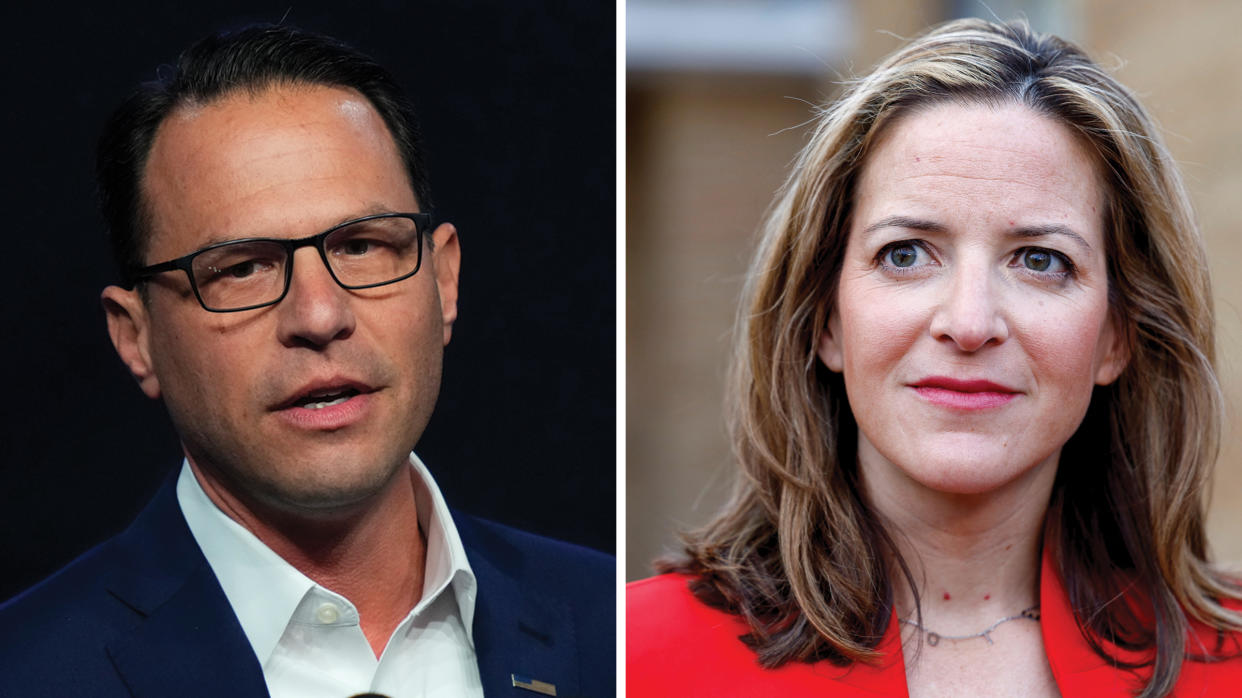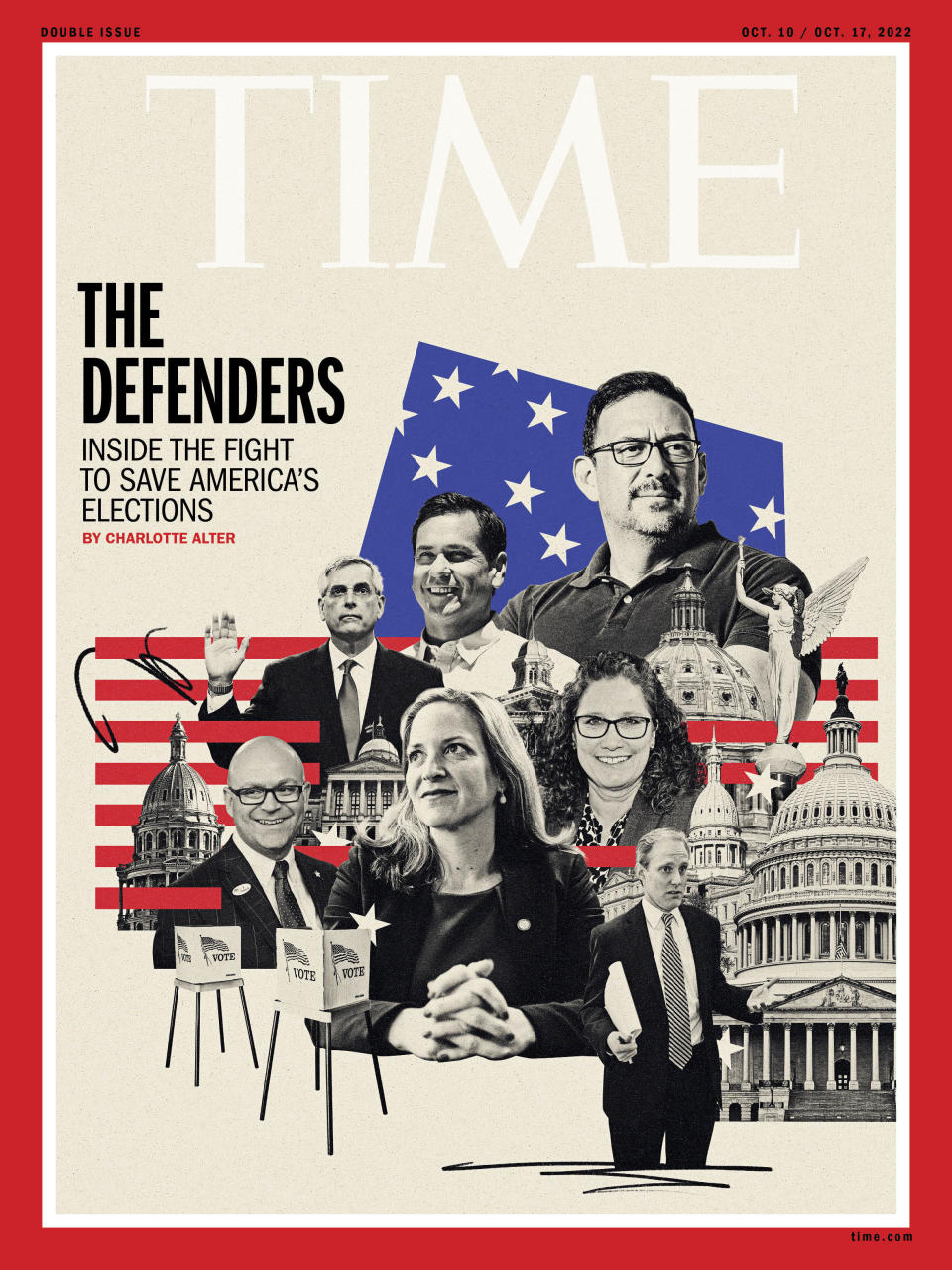Election Deniers Were Among the Biggest Losers of the 2022 Midterms

- Oops!Something went wrong.Please try again later.
Democratic gubernatorial candidate, Pennsylvania Attorney General Josh Shapiro speaks at a campaign rally in Philadelphia, Nov. 5, 2022; Michigan Secretary of State, Jocelyn Benson speaks to the media after voting in Michigan, Nov. 8, 2022. Credit - Shapiro: Matt Rourke—AP; Benson: Evelyn Hockstein—Reuters
The stakes could not have been higher. Across the country, Republican candidates who falsely say Donald Trump won the 2020 race ran for offices this year that would have put them in position to oversee elections in 2024. If an election-denier won an election-oversight job in a battleground state, they would have the ability to sow chaos, promote conspiracy theories about results, and potentially allow a candidate to seize the presidency in 2024 even if they weren’t chosen by the voters.
But in a series of key states, pro-democracy candidates came out on top. In Minnesota, incumbent Secretary of State Steve Simon defeated Kim Crockett, who questioned the results of the 2020 election. In the Pennsylvania gubernatorial race, state Attorney General Josh Shapiro defeated election denier and Stop the Steal organizer Doug Mastriano. (If elected Governor, Mastriano would have appointed a Secretary of State, the role that oversees the election in the commonwealth.) And in Michigan, incumbent Secretary of State Jocelyn Benson handily beat back Trump-endorsed Kristina Karamo, who pushed baseless conspiracy theories about the 2020 contest.

“Democracy has prevailed,” says Benson, who outran Democratic Gov. Gretchen Whitmer at the top of the ticket, receiving the most votes of any candidate in Michigan. This election “really wasn’t a red vs. blue or a Democrat vs. Republican choice,” Benson told TIME in an interview Wednesday. “It was an, ‘Are we gonna live in a democracy where truth rules the day?’ choice.”
Read More: Conspiracy Theorists Want to Run America’s Elections. These Are the Candidates Standing In Their Way.
Two high-profile Secretary of State races in Arizona and Nevada remain undecided, with votes still left to be counted. In Arizona, Democratic Secretary of State candidate Adrian Fontes leads Republican Mark Finchem, an election denier and Oath Keeper who marched at the Capitol on Jan. 6. With about 70% of the vote in, Fontes was outrunning the Democratic gubernatorial and senate candidates at the top of the party ticket. In Nevada, where many mail-in ballots are still left to be counted, Democrat Cisco Aguilar is neck-and-neck with Republican Jim Marchant, who founded the America First Secretary of State coalition to push MAGA conspiracy theorists into key election-oversight roles.
But the vast majority of America First Secretary of State candidates were defeated by either pro-democracy Republicans in GOP primaries earlier this year or by Democrats this week. As of midday Thursday, just one of the 17 candidates endorsed by the coalition, Diego Morales in Indiana, has prevailed.
“I think it’s more than just a vote of confidence in us as individuals. I think it’s a vote of confidence in the system generally,” says Minnesota Secretary of State Steve Simon, who won with 55% of the vote, more than any other statewide candidate. “I’m hoping it means we’re closer to breaking the fever.”
Many of the hundreds of pro-Trump election deniers did win their races this week. The Washington Post reports that more than 160 election deniers were projected to win House, Senate or key statewide office races by Wednesday.
Read More: How Democrats Defied History in the Midterms.
But such candidates fared poorly in contests for election-oversight posts. According to a tally from States United Action, a nonpartisan advocacy organization to protect fair elections, election deniers have won less than 14% of the races for statewide office that oversee elections, including governor, attorney general, and Secretary of State posts. According to the group’s tally, election deniers lost races for governor in 12 states, while the five election deniers who won were all incumbents. Election deniers lost races for Secretary of State in eight states and were elected in three states—Indiana, Wyoming, and Alabama.
“When it comes to the statewide positions that control our elections, Americans pretty decisively rejected the election deniers who wanted power of their votes,” says Joanna Lydgate, CEO of States United Action. “Really very few of these folks have been successful.”

